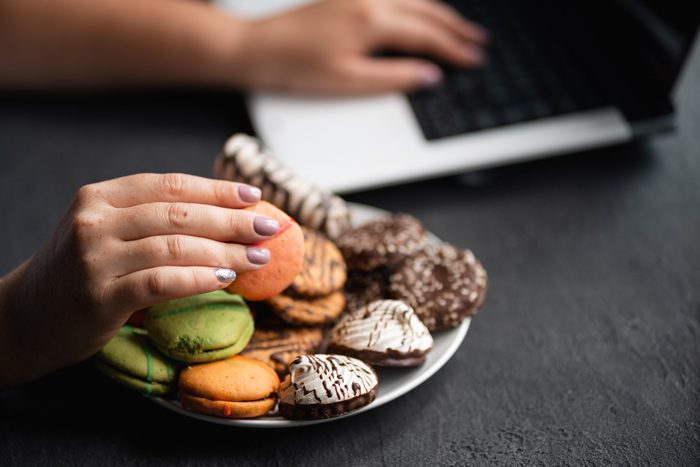 It is very common for people in recovery from an alcohol use disorder to crave sugar. In fact, you may find yourself wondering if you should be concerned about developing a sugar addiction.
It is very common for people in recovery from an alcohol use disorder to crave sugar. In fact, you may find yourself wondering if you should be concerned about developing a sugar addiction.
Sugar Addiction & Alcohol Addiction: Similarities
While a sugar addiction doesn’t cause the same level of disruption to your daily life as an addiction to alcohol, there are some distinct similarities. Studies have shown that your brain lights up with sugar just like it does when you drink to excess. Consider this:
- Both sugar and alcohol release large amounts of dopamine, a neurotransmitter that creates feelings of pleasure.
- Both are consumed compulsively regardless of negative consequences.
- A tolerance to sugar can develop in much the same way your tolerance to alcohol increases when you drink regularly.
- With continued use, the body starts to need sugar to function normally.
- You’ll experience temporary withdrawal symptoms when sugar is eliminated from the diet.
If you’re in recovery, limiting your sugar intake is a smart move because there is a real possibility that sugar could become a substitute addiction. This can make it harder for your body to heal the damage caused by your drinking. There is also evidence to suggest that higher consumption of added sugar will make it more difficult to keep alcohol cravings in check.
How a Sugar Addiction Develops
A sugar addiction can develop much in the same way that a person develops an alcohol use disorder. They turn to sugary foods when they are stressed, angry, or in need of emotional comfort. Sugar gives them a temporary boost—and they start to unconsciously view it as a “go-to” solution for a wide range of everyday problems.
For someone in recovery, a sugar addiction is hard to avoid because sugar hides in unexpected places. It’s legal, accessible, inexpensive, and in the vast majority of foods that Americans like to eat. Even things that don’t taste particularly sweet can be very high in added sugar. For example, the following foods have as much sugar as a glazed donut even though they seem relatively healthy at first glance.
- Blue Diamond vanilla almond breeze almond milk
- Activia vanilla Greek nonfat yogurt
- Thomas cinnamon raisin swirl bagel
- Mott’s original applesauce
- Ocean Spray original craisins
- Quaker apple and cinnamon instant oatmeal
- Raisin Bran cereal
How to Keep Sugar Consumption Under Control
Simple sugars are digested quickly and lead to blood glucose spikes. Insulin removes glucose from the blood and sends it to the cells of the body, but this can lead to an abrupt “crash” that leaves you craving more sugar to get your body’s glucose levels back to where they were. To break this cycle, you need to eat balanced meals with protein and complex carbohydrates that will help keep glucose levels stable.
The most effective way to keep sugar consumption in check is simply to limit your consumption of processed foods. When you choose to eat processed foods, read nutrition labels to see the grams of added sugar. You want to keep this number as low as possible. (Going back to our previous example, a glazed donut contains approximately 10 grams of added sugar.)
If you are reading ingredient lists, remember that sugar has many names. Added sugar can be listed as high fructose corn syrup (HFCS), sucrose, fructose, dehydrated cane juice, glucose, dextrose, syrup, cane sugar, raw sugar, and more.
Sugar Addiction Can Be Managed
Other tips to keep you limit your sugar consumption include:
- Don’t skip meals. Letting yourself get too hungry makes it easy to overindulge in high sugar foods.
- Choose healthy snacks. Make it easy to grab healthy snacks like apples, string cheese, and mixed nuts instead of sugary cookies and cakes. Healthy snacks ensure your body gets the nutrients it needs while keeping blood glucose levels stable throughout the day.
- Manage your stress. When you’re stressed, your body releases cortisol—a hormone known to intensify sugar cravings.
- Get enough sleep. If you’re getting less than eight hours of sleep per night, your body will try to compensate with a quick energy boost from added sugar.
Abstaining from added sugar can be challenging in the early stages, but you can take comfort in knowing that your body’s taste preferences will change over time. People who don’t consume added sugar regularly tend to find that processed foods generally taste too sweet to be satisfying—which makes it easier for them to follow a balanced diet.
We’re Here to Help
At Waypoint Recovery Center, we understand that a successful recovery requires leading a wellness-focused life. We encourage clients at our South Carolina residential treatment center to make good nutrition a foundation of their recovery plan, and we provide a full continuum of care that helps ease the transition back to independent living. Contact us today to learn more about our treatment programs and how we can help you take the first steps towards a brighter future.




